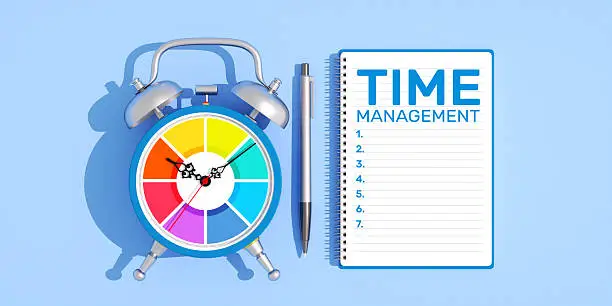Why Time Management Matters
Time is the one resource you can’t get more of. Once it’s gone, it’s gone. Learning how to manage your time is like mastering the art of controlling your life. It determines how much you get done, how you feel about your day, and ultimately, where you end up in life.
The Link Between Time Management and Success
Want to know the difference between successful people and those always playing catch-up? It’s not luck. It’s time management. Top performers like Bill Gates, Oprah Winfrey, and Elon Musk all credit their achievements to intentional, focused time use.
Real-Life Examples of Poor vs. Good Time Management
Imagine two students. One studies a little every day, follows a schedule, and sleeps well. The other crams the night before, skips meals, and burns out. Guess who scores better and feels less stressed? Yep—the one who planned their time. That’s the magic of time management in action.
Understanding the Basics of Time Management
What Is Time Management?
Time management means organizing and planning your time between tasks. The goal? To work smarter—not harder—so you get more done in less time.
Common Time Wasters and Productivity Killers
Think social media is harmless? Think again. Scrolling TikTok for “just five minutes” can snowball into hours lost. Other culprits include procrastination, disorganized workspaces, and unclear priorities.
Essential Time Management Skills Everyone Should Learn
Prioritization
Knowing what to do first is half the battle. Prioritization is the ability to rank tasks based on importance and urgency.
The Eisenhower Matrix
This method divides tasks into four quadrants: urgent & important, important but not urgent, urgent but not important, and neither. It helps you focus on what truly matters.
ABCDE Method
Brainchild of Brian Tracy, this technique labels tasks from A (most important) to E (can be eliminated). It’s like spring cleaning for your to-do list.
Goal Setting
Clear goals guide your actions.
SMART Goals
Make goals Specific, Measurable, Achievable, Relevant, and Time-bound. Want to get fit? Don’t just say “work out more”—say, “Jog 3x a week for 30 minutes.”
Long-Term vs. Short-Term Goals
Short-term goals keep you moving. Long-term ones give you direction. Think of them as stepping stones to your dream life.
Planning and Scheduling
Without a plan, you’re just reacting.
Daily Planning
Every morning (or the night before), jot down 3–5 key tasks. Focus on what moves the needle, not just busywork.
Weekly & Monthly Planning
Zooming out gives you clarity. Use Sundays to map your week, and the last day of each month to reflect and plan ahead.
Tools and Techniques for Better Time Management
Time-Blocking Technique
Block out chunks of time for specific tasks. For example, 9–11 AM = Deep Work, 11–12 = Emails. It reduces decision fatigue and boosts focus.
Pomodoro Technique
Work for 25 minutes, take a 5-minute break. After four cycles, take a longer break. This trick turns your brain into a productivity machine.
Task Batching
Group similar tasks together—like replying to emails or creating content. It saves mental energy and keeps you in flow.
The Two-Minute Rule
If it takes less than two minutes, do it immediately. You’ll be amazed how this clears clutter and keeps momentum high.
Digital Tools for Time Management
Top Time Management Apps
There’s an app for that—and many! Try:
Google Calendar
Your best friend for scheduling. Set appointments, block focus hours, and get reminders. Sync it with your phone for total control.
Setting Up Notifications and Alarms
Smart alerts keep you on track—without nagging. Just don’t overdo it. One ping per task is plenty.
Time Management for Work and Career Growth
Managing Tasks at Work
Use tools like Asana or ClickUp to collaborate and track progress. Don’t just be busy—be productive.
How Leaders Manage Their Time
Top leaders delegate, automate, and schedule everything. Warren Buffett says, “The difference between successful people and really successful people is that really successful people say no to almost everything.”
Time Management for Students
Study Plans and Deadlines
Create a study calendar. Color-code subjects. Set milestones. Beating the deadline is better than racing it.
Balancing School, Work, and Life
Use Sundays to plan your week. Combine tasks when possible (e.g., listening to podcasts during commutes). Avoid burnout by scheduling breaks too.
Common Time Management Mistakes and How to Avoid Them
Multitasking Myths
Spoiler: Multitasking lowers your IQ and productivity. Focus on one task at a time. You’ll finish faster and do better.
Perfectionism
Perfectionism is procrastination in disguise. Done is better than perfect. Fix it later if needed.
How to Build a Time Management Routine That Sticks
Morning Routines
Start your day with intention. Try journaling, light exercise, or reviewing your plan. Win the morning, win the day.
Night Routines
Prep for tomorrow. Reflect on what worked. Turn off screens early. Your brain needs time to recharge.
Tips from Experts and Successful Entrepreneurs
Elon Musk’s Scheduling Style
Musk divides his day into 5-minute slots. It’s intense—but shows how much micro-scheduling can supercharge output.
Warren Buffett’s Focus Principle
Buffett writes down his top 25 goals, then circles the top 5. He avoids the other 20 like the plague—that’s laser focus!
Conclusion
Mastering time management isn’t just about being productive—it’s about creating a life you love without feeling overwhelmed. Whether you’re a student, a CEO, or somewhere in between, developing time management skills puts you in control. Don’t wait to “find” time—make it, manage it, and own it.
FAQs
1. What is the best time management technique?
It depends on your style, but the Pomodoro and Time-Blocking techniques are popular because they’re easy to start and deliver fast results.
2. How can I improve my time management skills quickly?
Start by identifying time wasters, setting daily goals, and using a planner. Even small changes can yield big results.
3. Are time management apps worth it?
Absolutely! Tools like Notion and Todoist help you stay organized and focused—especially if you’re juggling lots of tasks.
4. Can I use time management skills to reduce stress?
Yes! When you plan your time, you’re less likely to forget things, miss deadlines, or feel overwhelmed.
5. Is multitasking ever a good thing?
Rarely. Multitasking often means doing multiple things poorly. It’s better to focus deeply on one task at a time.





